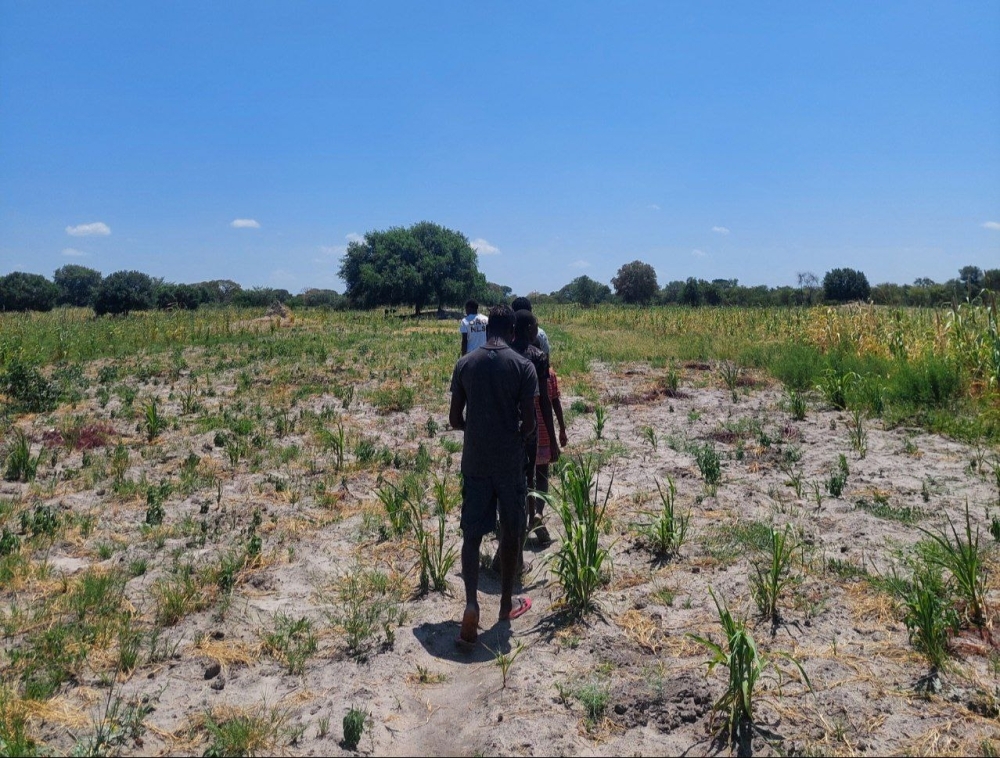Zambezi farmers grapple drought and locust infestation
Many farmers in the Zambezi Region are facing devastating challenges, such as drought conditions due to a lack of rain and an invasion of locusts inflicting havoc on their crops.
Farmers depend heavily on crop farming to sustain their families. However, with a lack of rainfall this year, the farmers are struggling to cultivate their fields.
Mbanga Musepehi (41), one of the affected farmers, told Namibian Sun that she has never experienced a drought so severe.
“My crops have completely dried up and I am worried about how I am going to sustain my family because we depend heavily on crop farming. Both my husband and I are unemployed, and we have five mouths to feed. As of late, we have been getting assistance from family members with our day-to-day needs; however, I am not one for handouts as I love to take care of my family myself,” she said.
“Locust swarms have also infested the region, destroying whatever crop survived the dry spell. Some farmers are left with nothing. Just weeks ago, there was an old lady who, upon returning from visiting family, suddenly collapsed and died after coming across her dried-up crop field,” she added.
Surveillance and action
A representative of the agriculture ministry in the region, Ndahalombili Nanhapo, said the ministry received the first report of locusts on 29 February.
“Two surveillance teams were subsequently deployed to assess the situation for five days," she said.
The first team visited 32 crop fields and the second team visited 29 crop fields.
"Both teams confirmed the presence of locusts, which were African migratory locusts. The damage was moderate, severe, or critical to all crop fields and grazing areas."
Both teams recommended spraying, starting with the most affected areas to control the locusts before they reproduce and reach the flying stage, Nanhapo said.
However, awareness must be raised before the actual spraying starts, she added.
The region has drafted a submission to request technical staff members to control the locusts. The exercise started on 15 March and will continue to 31 March. Another submission will be submitted for the following month.
[email protected]
Farmers depend heavily on crop farming to sustain their families. However, with a lack of rainfall this year, the farmers are struggling to cultivate their fields.
Mbanga Musepehi (41), one of the affected farmers, told Namibian Sun that she has never experienced a drought so severe.
“My crops have completely dried up and I am worried about how I am going to sustain my family because we depend heavily on crop farming. Both my husband and I are unemployed, and we have five mouths to feed. As of late, we have been getting assistance from family members with our day-to-day needs; however, I am not one for handouts as I love to take care of my family myself,” she said.
“Locust swarms have also infested the region, destroying whatever crop survived the dry spell. Some farmers are left with nothing. Just weeks ago, there was an old lady who, upon returning from visiting family, suddenly collapsed and died after coming across her dried-up crop field,” she added.
Surveillance and action
A representative of the agriculture ministry in the region, Ndahalombili Nanhapo, said the ministry received the first report of locusts on 29 February.
“Two surveillance teams were subsequently deployed to assess the situation for five days," she said.
The first team visited 32 crop fields and the second team visited 29 crop fields.
"Both teams confirmed the presence of locusts, which were African migratory locusts. The damage was moderate, severe, or critical to all crop fields and grazing areas."
Both teams recommended spraying, starting with the most affected areas to control the locusts before they reproduce and reach the flying stage, Nanhapo said.
However, awareness must be raised before the actual spraying starts, she added.
The region has drafted a submission to request technical staff members to control the locusts. The exercise started on 15 March and will continue to 31 March. Another submission will be submitted for the following month.
[email protected]




Comments
Namibian Sun
No comments have been left on this article